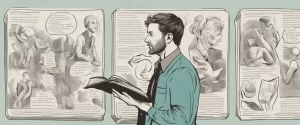——Meditation for Fidgety Skeptics by Dan Harris & The Wisdom Jesus by Cynthia Bourgeault

In the vast realm of spiritual literature, countless books offer guidance and inspiration for those seeking a deeper understanding of themselves and the world around them. Within this vast ocean of knowledge, two distinctive works swim against the current, bringing unique perspectives on the ancient practice of meditation. “Meditation for Fidgety Skeptics” by Dan Harris and “The Wisdom Jesus” by Cynthia Bourgeault embark on separate quests to explore the transformative power of meditation, each author approaching the subject from their own distinct vantage point. In this comparative study, we will delve into the depths of these two remarkable books, examining how they shed light on the practice of meditation and its potential to reshape our lives.
Firstly, we encounter “Meditation for Fidgety Skeptics” by Dan Harris, a renowned ABC news anchor and well-known skeptic. Harris approaches meditation with a dose of healthy skepticism, seeking to demystify the practice and make it more accessible to a broad audience. Through his engaging writing style and relatable anecdotes, Harris breaks down the barriers that often alienate those who view meditation as too abstract or esoteric. With the intention of appealing to the restless souls who struggle to sit still, Harris explores the practical aspects of meditation, offering helpful techniques, tips, and a compelling perspective on the benefits it can bring to even the most fidgety individuals.
On the other hand, we have Cynthia Bourgeault’s “The Wisdom Jesus,” a captivating exploration of meditation through the lens of the teachings of Jesus Christ. As an Episcopal priest and spiritual teacher, Bourgeault introduces a refreshing perspective that resonates with those seeking a connection between Christian thought and the practice of meditation. In her profound work, Bourgeault delves into the Gospels, weaving together ancient wisdom and contemporary spiritual insight to present a vision of Jesus as a master of meditation and awakening. By exquisitely blending her extensive knowledge of Christian theology with meditation practices, Bourgeault invites readers on a thought-provoking journey that challenges conventional interpretations and opens up new possibilities for spiritual growth.
While at first glance, these books may seem worlds apart in their thematic approach, their shared emphasis on meditation unites them in an unexpected harmony. “Meditation for Fidgety Skeptics” invites us to explore the pragmatic side of meditation, while “The Wisdom Jesus” beckons us to discover the mystic depths inherent in this ancient practice. Through this comparative study, we aim to examine the differing perspectives offered by Dan Harris and Cynthia Bourgeault, unravel their unique contributions to the meditation discourse, and ultimately discern how these works can enrich our own understanding and practice of meditation. By embarking on this comparative journey, we invite readers to navigate the waters of spiritual literature and chart their own course towards a more profound and meaningful existence.
Brief Summary of Two Books
Meditation for Fidgety Skeptics by Dan Harris
“Meditation for Fidgety Skeptics” by Dan Harris is a guidebook aimed at individuals who are curious about meditation but skeptical of its benefits. Building on his own experiences and the success of his previous book, “10% Happier,” Harris sets out to demystify meditation and make it accessible to a wider audience.
The book begins with Harris sharing his personal struggles with anxiety and stress, leading to his eventual discovery of meditation. He acknowledges the common misconceptions and preconceived notions that often deter people from trying meditation, such as the perception that it is tied to religious or spiritual beliefs. By presenting meditation as a secular practice with proven scientific benefits, Harris narrows the gap between the skeptical reader and the practice itself.
To address the common roadblocks to meditation, Harris embarks on a cross-country journey with his friend Jeff Warren, a meditation teacher, and explores practical ways to integrate meditation into everyday life. Throughout the book, the duo engages with skeptical individuals – from police officers to Marines – who are initially resistant but open to giving meditation a chance.
Harris offers a variety of meditation techniques, helping readers find an approach that suits their personality and lifestyle. He emphasizes the importance of starting small, focusing on just a few minutes a day, and maintaining realistic expectations. The book also covers common obstacles, such as dealing with a wandering mind or finding time to meditate.
“Meditation for Fidgety Skeptics” aims to empower individuals with the tools to incorporate meditation into their lives and experience its benefits firsthand. By combining personal anecdotes, scientific research, and practical advice, Harris provides a relatable and informative guide that encourages skeptics to give meditation a try.
The Wisdom Jesus by Cynthia Bourgeault
“The Wisdom Jesus” by Cynthia Bourgeault explores the teachings and insights of Jesus from a unique perspective. Bourgeault delves into the mystical and contemplative aspects of Jesus’ message, focusing on his invitation to deep transformation and the embodiment of divine wisdom. She argues that Jesus was not primarily a moral teacher or a savior figure, but a wisdom master who offered a path of consciousness and awakening.
Bourgeault explores various themes, such as the hidden teachings of Jesus, the relationship between Jesus and the wisdom tradition of the ancient Near East, and the profound implications of Jesus’ call to a higher state of being. She proposes that by engaging in contemplative practices, individuals can connect with the divine consciousness that Jesus embodied and enter into a transformative journey towards spiritual awakening.
Throughout the book, Bourgeault draws upon historical and theological research, as well as personal experiences and insights, to present a fresh interpretation of Jesus’ teachings. She encourages readers to explore the transformative power of these teachings, emphasizing the importance of not just understanding them intellectually, but embodying them in daily life.
“The Wisdom Jesus” invites readers to look beyond traditional interpretations of Jesus and to engage with his teachings in a way that leads to a deepened spiritual awareness and a more profound relationship with the divine.
Comparison between Two Books

Similarities in Psychology
In both “Meditation for Fidgety Skeptics” by Dan Harris and “The Wisdom Jesus” by Cynthia Bourgeault, there are several similarities in terms of the psychological aspects discussed. Here are some points of parallelism:
1. Awareness and Mindfulness: Both books emphasize the significance of awareness and mindfulness in our lives. They highlight how cultivating an attentive and present state of mind can lead to a greater understanding of ourselves and the world around us.
2. Negative Thought Patterns: Both authors address the issue of negative thought patterns and how they can affect our mental well-being. They discuss techniques and perspectives that can help individuals break free from harmful thought loops and find greater peace of mind.
3. Emotion Regulation: Psychology plays a role in understanding and regulating our emotions. In both books, the authors discuss how meditation and contemplative practices can assist in developing emotional intelligence and resilience. They explore the connection between our thoughts, emotions, and reactions, offering insights on managing and transforming difficult emotions.
4. Self-Exploration and Self-Reflection: Psychology often involves self-exploration and self-reflection. Both authors aim to guide readers towards a deeper understanding of themselves. They discuss the importance of introspection and provide tools for individuals to uncover their own patterns, motivations, and beliefs.
5. Overcoming Resistance and Skepticism: The concept of skepticism is explored in both books. Dan Harris focuses on addressing the skepticism many people may have towards meditation. Cynthia Bourgeault highlights how skepticism can hinder our spiritual growth and proposes ways to overcome it. Understanding the psychological factors behind skepticism and resistance is a key element of their teachings.
6. Transformation and Personal Growth: Psychology recognizes the potential for growth and transformation in individuals. Both authors explore how meditation and the practice of mindfulness can contribute to personal development, leading to positive changes in various aspects of life.
While “Meditation for Fidgety Skeptics” primarily focuses on meditation and its psychological benefits, “The Wisdom Jesus” delves into the psychological and spiritual dimensions of Christianity. Nevertheless, both books highlight the interplay between psychology, spirituality, and personal well-being.
Divergences in Psychology
Both “Meditation for Fidgety Skeptics” by Dan Harris and “The Wisdom Jesus” by Cynthia Bourgeault delve into the realm of spirituality and personal growth, but they approach the subject matter from different perspectives. When it comes to the divergence about psychology in these books, there are several noticeable differences.
In “Meditation for Fidgety Skeptics,” Dan Harris, a renowned news anchor, explores the benefits of meditation from a more secular and scientific standpoint. Harris provides a practical guide for skeptics who might find it difficult to embrace meditation. He incorporates elements of cognitive psychology and behavioral science to help readers understand how meditation can affect the mind and behavior. By focusing on psychological aspects such as stress reduction, increased self-awareness, and emotional regulation, Harris aims to make meditation accessible to a broader audience.
On the other hand, “The Wisdom Jesus” by Cynthia Bourgeault approaches spirituality from a more theological and mystical perspective. Bourgeault delves into the teachings and wisdom of Jesus, shedding light on his role as a spiritual teacher rather than solely a religious figure. While psychology is not the primary focus of Bourgeault’s book, she explores how the teachings of Jesus can be understood in light of the practices and principles of contemplative psychology. She delves into the concept of transformative spirituality and emphasizes the importance of inner work and self-realization.
Therefore, the divergence in the approach to psychology in these books lies in their primary focus. “Meditation for Fidgety Skeptics” places a strong emphasis on the psychological benefits of meditation and the scientific understanding of the mind, while “The Wisdom Jesus” explores the intersection between spirituality and psychology, examining how inner work can lead to personal transformation.
It is important to note that while both books touch on the psychology of the mind, Harris’s book provides a more practical and accessible approach for skeptics seeking to incorporate meditation into their lives, while Bourgeault’s book delves deeper into the mystical and theological aspects of spirituality, using psychology as a tool to understand and enhance those experiences.

Conclusion
It ultimately depends on your individual interests and preferences. “Meditation for Fidgety Skeptics” by Dan Harris offers practical guidance and insights into incorporating meditation into a busy, modern lifestyle. It addresses common misconceptions about meditation and provides a relatable perspective for those who may be skeptical about its benefits.
On the other hand, “The Wisdom Jesus” by Cynthia Bourgeault delves into a more spiritual exploration of Jesus’ teachings and their relevance in today’s world. It offers a fresh perspective on Christianity, emphasizing the transformative wisdom present in Jesus’ teachings and the potential for personal and societal growth.
Both books offer valuable content, but they cater to different interests. If you’re looking for a practical guide to meditation and mindfulness, “Meditation for Fidgety Skeptics” might be more suitable. However, if you’re interested in a deeper exploration of the teachings of Jesus and their potential spiritual implications, “The Wisdom Jesus” could be a more worthy read for you.


